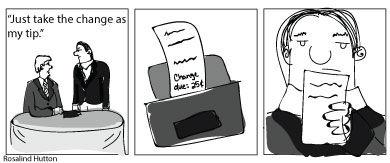Tipping: the only interaction with another human being where size does matter, regardless of what anyone tells you.
But have you ever questioned who gets tipped and why? Why should one tip an individual who transports pizza to our house, but not someone who delivers human beings to the hospital? Why tip a barber, but not a laser hair removal specialist? As an international student, a lot of tipping questions race through my mind.
Internationally, “tipping culture” is not absent. However, it is not as prominent as it is in the U.S. In India, my place of origin, most restaurants have a service charge which is pocketed by the person who busses your table (unless otherwise stated). In Japan, tipping at a restaurant is rude and unacceptable. However, tipping is the norm in the U.S. and you are a jerk if you do not. This triggered my inquisitiveness to explore more than just the tip of this iceberg.
Tipping is a system entrenched in inequity and discrimination, and prospers in a hostile work environment where the biggest sufferers are hardworking individuals. Eliminating tipping in restaurants immediately would create turmoil.
Hence, increasing the minimum wage of tipped workers to the federal minimum wage would be a step in the right direction. Nevertheless, it should not deter us from the path of eventual abolishment of tipping, which could be replaced by a service charge ensuring employees get paid fairly.
One of the reasons tipping is a custom in the U.S. is because of the federal minimum wage for individuals in a tipped occupation is set at a massive $2.13 per hour. As a result, tipped workers are responsible for the rest of their income through tips. This forms an atmosphere of waiters pleasing their customers in order to make a living. It also creates an environment where waiters/waitresses must tolerate a hostile working environment to sustain themselves.
A study conducted in The Restaurant Opportunities Centers United Forward Together’s “The Glass Floor,” 66 percent of restaurant workers reported facing harassing behaviors from restaurant management, 80 percent from co-workers and 78 percent from customers. Thirty percent of women and 22 percent of men also reported being touched inappropriately as quite common.
According to Michael Lynn and Glenn Withiam of Cornell University, employees also reported a gulf of pay that existed between non-white and white servers.
There are ample problems in the system itself, but my qualms with tipping does not end at the structure shortchanging and discriminating amongst its employees, it also inconveniences customers.
Tipping breeds an environment of discrimination in which people of color, women, foreigners, young and old people tend to get less monetary compensation than their Caucasian male peers. However, I am not excessively concerned about receiving inadequate service. I am more troubled by the system mandating me to conduct a blazingly quick customer service analysis, calculate the right amount of money in percentages while being held hostage by the person serving me.
Also, it is embarrassing to tip less than the required amount since you come across as an entitled miser.
According to Ofer H. Azar of Northwestern University, “When we disobey the norm of tipping, we suffer an emotional disutility.” This is a fancier manner of saying we feel embarrassed, guilty and our self-image is hurt when we do not obey norms. Unless your idea of pleasure is doing mathematics while your self esteem is slowly being chipped off every meal, I recommend a change in this system that not only shortchanges and discriminates amongst its employees, but also inconveniences its customers.
If you liked this article please do not forget to tip The Reflector a few dollars in gratuity!
Categories:
Raise the minimum wage, and do away with tipping

Raise the minimum wage, and do away with tipping
0
Donate to The Reflector
Your donation will support the student journalists of Mississippi State University. Your contribution will allow us to purchase equipment and cover our annual website hosting costs.
More to Discover





